
How to cope with an HIV diagnosis
Peer reviewed by Dr Krishna Vakharia, MRCGPLast updated by Lydia SmithLast updated 23 Nov 2023
Meets Patient’s editorial guidelines
- DownloadDownload
- Share
- Language
- Discussion
- Audio Version
People with HIV can live long, full, healthy lives with the right treatment and support. However, receiving a diagnosis of HIV can have a significant effect on someone's mental health - in part, due to misinformation and stigma.
In this article:
Video picks for HIV and AIDS
Continue reading below
How an HIV diagnosis can impact mental health
Ian Green, former CEO of the HIV/AIDS charity Terrence Higgins Trust, says people living with HIV in the UK are twice as likely to experience poor mental health than the general population1.
"Often, this is because of negative attitudes towards the virus that are stuck in the 1980s," he says. "HIV carries a lot of stigma, often because people lack information about it or they make judgements about how someone has contracted HIV. This is because HIV is mainly transmitted through sex and can be linked to activities such as injecting drug use.
"Feeling ashamed or guilty about your HIV status can stop you from taking an active role in society, isolating yourself and preventing you from living a full and enjoyable life."
If you've just been diagnosed with HIV, it’s normal to feel upset, shocked or angry. You might be having trouble taking in the diagnosis or begin to question your future. It's also natural to start thinking 'what if' - which can lead to anxiety.
How to cope with an HIV diagnosis
Back to contentsRemember modern treatments can mean a long life
Although there's no cure yet for HIV, treatments are very effective and mean most people with the virus can live a long and healthy life. Many people with HIV are living full lives, including Queer Eye's Jonathan Van Ness and rugby star Gareth Thomas.
If you're diagnosed with HIV, you'll have regular blood tests to monitor the progress of the HIV infection. Treatment can be started at any point following your diagnosis, depending on your circumstances and following a consultation with your HIV doctor. HIV is treated with antiretroviral medicines, which work by stopping the virus replicating in the body. This allows the immune system to repair itself and prevent further damage.
"This treatment can be as simple as taking one or two pills once a day," says Green. "Successful HIV treatment also means you can expect to live as long as anyone else. Also, advancements in treatment mean that HIV positive parents can have HIV negative children."
Get as much accurate information as you can
There are a lot of myths and false information surrounding HIV, which can lead to additional anxiety if you've received a positive diagnosis. Seeking up-to-date, accurate information is important. If you're unsure about anything, speak to your doctor.
"It's important to know that if someone with HIV is taking effective treatment they cannot pass on the virus," says Green. "Treatment suppresses the virus to a level where it is undetectable and therefore can't be passed on.
"It can take up to six months from starting treatment for some people to become undetectable," he adds. "It's now recommended that everyone diagnosed with HIV starts treatment straight away – regardless of their CD4 count, which is a measure of the health of your immune system."
Seek professional support for your mental health
If you're struggling with your mental health, you should speak to your doctor about accessing therapy. Charities such as the Terrence Higgins Trust and Positively UK also offer counselling, information and access to peer support, where you can speak to others living with HIV.
Peer support groups can be a great way to alleviate loneliness or fear, and come to terms with a positive diagnosis.
Think about your coping mechanisms
Many people turn to healthy coping mechanisms when they are going through a difficult period. It can help to think about what helps you, for example, relaxing hobbies, exercise, reading or joining a support group.
Speak to people you trust
If you have HIV, it's important your current sexual partner and any previous partners you've had since becoming infected are tested and treated.
It's normal to feel upset or worried about discussing HIV, but it can help to speak to friends or family members you trust so you don't feel isolated. Think about what you want to tell them and why - for example, if you want their support so you don’t feel alone.
It's not always easy to discuss a positive diagnosis, but talking to loved ones helps to lighten the psychological load - and helps break the stigma surrounding HIV.
Continue reading below
Further reading
Back to contentsPatient picks for HIV and AIDS

Sexual health
Stigma of HIV and representations in the media
40 years into the HIV pandemic, the medical advances in HIV prevention and treatment are dramatic and live-saving. Unfortunately, these advances are not paralleled by changes in attitude, and HIV stigma and discrimination remain embedded in our culture. The media plays a central role in shaping dangerous narratives, often representing people living with HIV as irresponsible and unhealthy.
by Amberley Davis

Sexual health
Scientists identify a mechanism to 'neutralise' HIV
A multinational team of experts may have accidentally identified a mechanism to neutralise the HIV virus.
by Ashwin Bhandari
Continue reading below
Article history
The information on this page is peer reviewed by qualified clinicians.
23 Nov 2023 | Latest version
25 Jan 2023 | Originally published
Authored by:
Lydia Smith

Ask, share, connect.
Browse discussions, ask questions, and share experiences across hundreds of health topics.

Feeling unwell?
Assess your symptoms online for free
Sign up to the Patient newsletter
Your weekly dose of clear, trustworthy health advice - written to help you feel informed, confident and in control.
By subscribing you accept our Privacy Policy. You can unsubscribe at any time. We never sell your data.